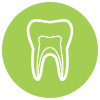Wisdom teeth are the third set of molars and final set of teeth to form, typically during your adult life. These teeth are situated right at the back of your jaw and individuals commonly have four wisdom teeth in total – two on the top jaw and two more on the bottom.
They don’t start forming until you are about seven or eight, unlike the other adult teeth that grow and erupt during your childhood years. Wisdom teeth typically erupt at the age of 18 and no later than 30 years of age.
Issues with wisdom teeth only arise when there is not enough space in your jaw, or your wisdom tooth has got stuck in the wrong position when erupting. This is quite a common scenario and is why they tend to cause pain and discomfort when they emerge.
You may not have to extract your wisdom teeth at all, as in some cases pain and discomfort due to wisdom teeth growing is quite normal. In order to find out if you need wisdom teeth removal or not, it is best to get in touch with your dentist and talk about your specific situation.
What are impacted wisdom teeth and why do they cause problems?
Why do wisdom teeth cause issues?
Wisdom teeth can be really troublesome and an estimated 85% of people have their wisdom teeth extracted. Over time, human jaws have shrunk in size. Nowadays your jaw often doesn’t have enough space for 32 teeth (including your wisdom teeth). Wisdom teeth that have no room to grow into start to push against other teeth, which causes pain and discomfort.
Impacted wisdom teeth
When a wisdom tooth is not able to fully emerge to the surface and is only partially emerging or has remained hidden in the gums, we call this an impacted wisdom tooth. These types of teeth will affect the health of your surrounding teeth as well as cause other oral health problems.
A tooth that has pushed out at the wrong angle will directly impact the surrounding teeth by pushing them out of place and could cause overcrowding of teeth which will, over time, affect your entire jawline. Impacted wisdom teeth could cause the tooth next to your wisdom tooth, the second molar, to be more susceptible to problems like infections or decay.
It’s necessary that you visit your dentist to get advice if you have any tooth ache at all, because it may not just be one tooth that’s in trouble in the case of impacted wisdom teeth. Due to decay, you may end up having to get more than one tooth pulled out – that is, not just the original wisdom tooth but the one next to it as well.
Issues with wisdom teeth?
Wisdom teeth may trigger multiple symptoms such as:
Bleeding or Swollen Gums and Soreness
As wisdom teeth come through, they will push against surrounding teeth causing them to move and shift. This movement can create discomfort in the jaw, and symptoms could include pain, swelling and stiffness, causing difficulty in opening the jaw and even breathing. They can also cause your gums to become swollen and red, and can be painful to touch and, in some cases, they could cause the gums in the area to bleed as well.
Sinus Pains
Wisdom teeth erupting on the upper jaw could cause issues with the sinuses. This is because the roots of the wisdom teeth sometimes develop and grow up against the sinus cavity, causing immense pressure and pain. If your wisdom teeth affect your sinuses, it can also cause headaches and congestion.
Trouble when chewing food
As wisdom teeth emerge, they can make it troublesome to chew when eating food. It could simply be temporary growing pains as the tooth comes through, creating pressure on the other teeth, or it could be a sign of an impacted tooth causing problems. If your teeth have shifted, the misalignment could cause difficulties in moving your jaw.
How to self-treat wisdom tooth pain
If you are experiencing any pain because of new wisdom teeth emerging, it is important to make an appointment with your dentist to assess the condition.
Here are some at-home remedies that you can use to ease the discomfort you are experiencing, while you wait for your new wisdom teeth to settle in.
1. Over-the-counter pain relief
Ibuprofen works really well to help with the swollen gums and sore jaw, due to its anti-inflammatory properties.
Paracetamol and Aspirin is good for pain relief. It will dull the pain in your mouth and jaw.
It’s important, however, that you consult your doctor to make sure there aren’t any contraindications of taking this medication and you must make sure to take them as prescribed.
2. Saltwater rinse
Rinsing with a warm water and salt solution will help promote your gum health and will also kill any bacteria that could be in the area.
3. Apply an icepack
If you are suffering from swollen gums and sore jaw, you can apply an icepack to numb the area around your cheek. This will help with the inflammation by reducing it. You can even try swilling some ice water in your mouth; the cold will help numb the area and reduce the pain.
Do not apply any heat to your face when you are suffering from wisdom tooth pain. This is because heat can aggravate an infection, if there is one, and can result in even more swelling and pain.
Wisdom teeth removal procedures
At your initial consult, the dentist will complete a thorough examination of your teeth. This will allow them to give you more information on whether you need to have your wisdom teeth pulled out or not. Often this will mean you need to have an OPG, which is a full mouth x-ray, so that the dentist can examine your wisdom teeth as well as the surrounding structures accurately.
Your dentist can provide a few options to you depending on your specific case. Treatment options include:
- In-chair wisdom teeth extraction
- Specialist in-chair wisdom teeth removal
- In-chair sedation
- General anaesthetic sedation
To learn more about the full wisdom tooth removal procedure options, click on the link below.
Summary
Watch Dr. Alistair explain and answer some questions on wisdom teeth in our video below.
To find out more information on aftercare for wisdom teeth extractions and how early intervention can help reduce complications, read the article below.
If you’re experiencing any pain or discomfort due to your wisdom teeth, call the friendly team of dentists at Fernvale Dental or book an appointment online.
Meet the Author

Dr Kapil Raniga
Dental Surgeon (BDSc Qld)
Dr Kapil Raniga grew up in Brisbane where he went to school at John Paul College on an academic scholarship. He attended the University of Queensland where he successfully completed his Bachelor of Dental Science degree. After working in Ipswich for several years, he opened our Plainland practice.













